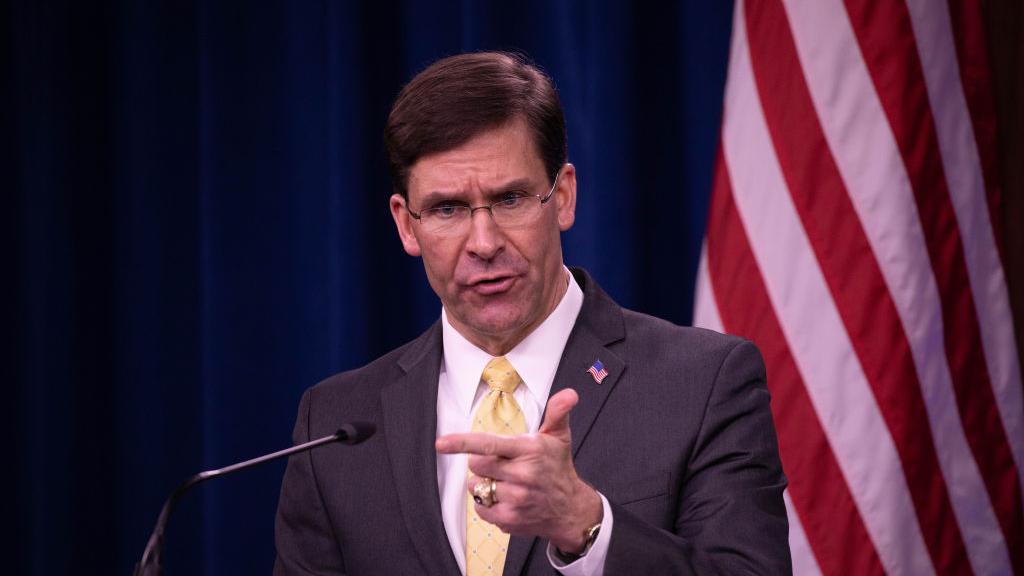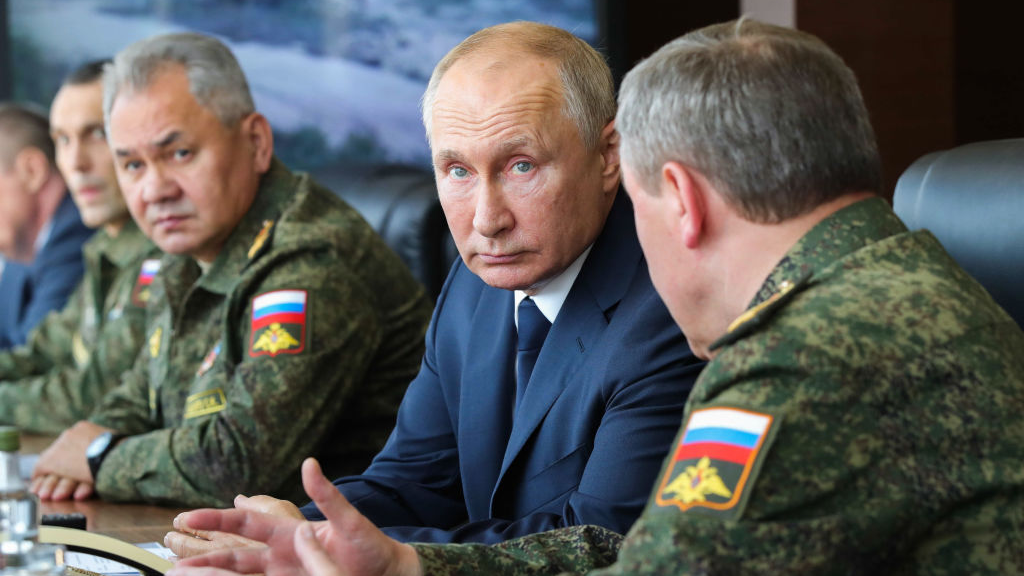
U.S. Secretary of Defense Mark Esper speaks during a joint press conference following a meeting with UK Secretary of State for Defense Ben Wallace at Pentagon in Arlington, Virginia, March 05, 2020. /Getty
U.S. Secretary of Defense Mark Esper speaks during a joint press conference following a meeting with UK Secretary of State for Defense Ben Wallace at Pentagon in Arlington, Virginia, March 05, 2020. /Getty
Editor's note: Danil Bochkov is an expert at the Russian International Affairs Council. He got master of economics cum laude at MGIMO-University under the Ministry of Foreign Affairs of Russia and master of world economy from the University of International Business and Economics in China. The article reflects the author's opinions and not necessarily the views of CGTN.
On October 20, U.S. Secretary of Defense Mark Esper unveiled Guidance for Development of Alliances and Partnerships, which calls on "like-minded democracies" to forge an alliance against Russia and China. Chinese Foreign Ministry rushed to debunk on such threats stressing that Beijing has never wanted to provoke or replace anyone, but has rather been seeking world peace and stability.
Importantly, it is not the first time that China and Russia get caught up in American attempts to establish global anti-China front. In late July, U.S. Secretary of State Mike Pompeo made a similar appeal to nations for the formation of the alliance against the Communist Party of China (CPC). China's Foreign Minister Wang Yi then highlighted that the U.S. acts out of its own interests and any conscious country with an independent will should not join such initiatives.
It may be noticed that the wording of Esper and Pompeo remains critic of China while it aims to consolidate nations as opposed to Beijing. The formula "like-minded democracies" speaks of nothing else but ideological confrontation launched by the U.S. against China and Russia.
Moscow became the target of American ideological crusade a way earlier – during the 2016 U.S. elections following the clash of interests with the U.S. over Russia's bald political maneuvers in Ukraine and Syria from 2014 to 2015.
China is a relatively new locus of Washington's ideological attacks which came under American spotlight following moves in Hong Kong, which Washington regards as violation of human rights. It might have become a stimulus for the White House to start full-fledged campaign against China.
Remarks by Pompeo and Esper add to earlier rebukes by the National Security Advisor Robert O'Brien in a speech in June blaming China as a threat to the U.S. and the very way of Americans' life.
The U.S. might have upped the ante with such thorny remarks against its two main rivalries – China and Russia – anticipating the upcoming November election. Now both candidates' campaigns are reaching their culmination, Joe Biden seems to be going ahead of Donald Trump, although some critical states are left to decide.
Now with the second wave of the pandemic hitting America even harder, Trump has no other choice but to reinforce his positions with some brilliant wins which would appeal to swing voters. In order to be substantial to affect the voting such wins, he must feature two main topics of recent years' debates in America – Russia and China.
On the Russian front, both countries have just achieved a breakthrough in talks concerning the New Strategic Arms Reduction Treaty (the New START).

R-L: Valery Gerasimov, Russia's First Deputy Defence Minister and Chief of the General Staff of the Russian Armed Forces, Russia's President Vladimir Putin, and Russia's Defence Minister Sergei Shoigu attend the Kavkaz-2020 (Caucasus 2020) military drills at Kapustin Yar training ground in Russia, September 25, 2020. /Getty
R-L: Valery Gerasimov, Russia's First Deputy Defence Minister and Chief of the General Staff of the Russian Armed Forces, Russia's President Vladimir Putin, and Russia's Defence Minister Sergei Shoigu attend the Kavkaz-2020 (Caucasus 2020) military drills at Kapustin Yar training ground in Russia, September 25, 2020. /Getty
Although the agreement is rather a temporary measure it is better than the collapse of this last acting instrument of arms control between Russia and the U.S., when Washington rejected the latest proposal by Vladimir Putin to extend the agreement.
As for the China's agenda – Trump has been opting for maximum pressure rhetoric in order to demonstrate that "nobody has been tougher on China" than he. All the recent harsh remarks about CPC and its ideology fall into anti-China logic, which he hopes could bring him extra ballots.
Another possible rationale behind more vigorous criticizing of Russia and China may be a geostrategic competition. As a sign of Washington's hostile classification of Moscow and Beijing – already in 2017 Russia along with China was dubbed by the U.S. national security strategy paper as "rival powers," which challenge American power, influence and interests.
Similar assertions were reiterated by Esper on a September 16 event, when he underscored that "revisionist powers (referring to Russia and China) are using predatory economics, political subversion and military force" to shift the balance of power. Such formulations list three key areas of U.S. vis-à-vis China and Russia confrontation – politics, economics and military, which are complemented by ideological antagonism exemplified above.
The U.S. recognizes that Russia is growing stronger with its foreign policy capabilities, which have been epitomized not only by its operations in Syria and Crimea, but most recently as peace-broker in Nagorno-Karabakh between Armenia and Azerbaijan.
China has also showcased its growing ambitions by resisting U.S. pressure to make concessions in a trade war. Beijing has also been going head to head with the U.S. over the South China Sea. In July, Washington for the first time published its official position on the issue stressing China's behavior there "unlawful." Washington has accelerated its grip on the so-called "The Quad," which held a meeting of the groups high ranking representatives in October and is currently expecting Australia to join the upcoming naval drills for the first time since 2007.
Russia and China recognize accumulating threat coming from the U.S. and its like-minded allies by upgrading relations for a "new era," moving towards a more strategic and trustworthy nature by collaboration on the creation for China of a missile launch detection system and exploring new areas of cooperation such as "information warfare," blocking illegal online content, de-dollarization of the global economy and global governance.
Feeling the "pressure" from the U.S. – Russia, and China may seek to deepen their ties as "like-minded states," which could backfire on the U.S. initiative.
(If you want to contribute and have specific expertise, please contact us at opinions@cgtn.com.)